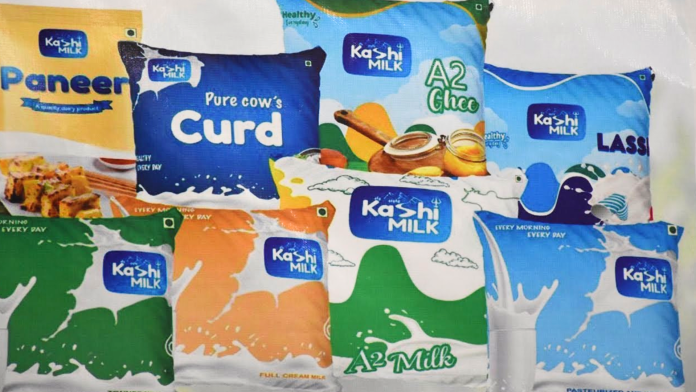Kashee Milk Producer Organization announced on Monday that it is set to achieve a turnover of INR 200 crore by the end of the 2023-24 financial year, a significant achievement within just two years of operation. This success is largely supported by the increased participation of women milk farmers. According to Chief Executive Manvir Singh, this projected turnover signifies a substantial six-fold increase in revenue for the organization. Initially recording a topline of INR 37 crore during its first full year in operation in 2022-23, which began on March 9, 2022.
“We have silently become an army of rural women milk famers determined to become the harbinger of the dairy sector. In the process we have witnessed a rise of over 2,000 lakhpati didis so far and by the end of the year the number will cross 3,000 – thanks to the fast-growth attributed to the fair and transparent procurement price paid to the members,” he said.
He added, “One of our members has earned over INR 30 lakh for her milk contribution in 18-19 months of our operations, he pointed out. “We have set a target of INR 300 crore for the next financial year. In addition to bulk milk sales, we will foray into packed products with Kashi flavor.”
The establishment of the Kashee Milk Producer Organization received backing from the National Rural Livelihood Mission (NRLM) and the UP State Rural Livelihood Mission (UPSRLM), along with technical guidance from NDDB Dairy Services (NDS), a subsidiary of the National Dairy Development Board (NDDB).
Singh also praised the comprehensive role that NDDB, led by Chairman Meenesh Shah, is playing in advancing the dairy sector’s development in the region.
KMPO chairperson Shrimati Sarita Devi said “from our total revenue, 90 per cent was given to member farmers last year in terms of milk price and incentives and going by the same norms, INR 180 crore would have been transferred in the accounts of women dairy kisans, spread over five districts of the region during this financial year.”
“At present, our peak milk collection has touched a high of 1.15 lakh liters a day and in the next few months we will become an organization with an annualized per day average collection of one lakh liters of quality milk for the benefit of consumers.
“Next year we will expand our milk collection to Varanasi and Bhadohi districts, adding at least three hundred more villages to our network apart from expanding in the five districts of Balia, Gazipur, Mirzapur, Sonbhadra and Chandauli,” Sarita Devi said.
Members receive their milk payments in three monthly cycles, directly deposited into their bank accounts. They also have access to a mobile application that allows them to monitor the quantity and quality of their milk in real-time, providing information on their earnings every 10th day of the month.
Furthermore, the organization is offering members assistance with fodder, feed, and veterinary care to fulfill its mission of empowering rural dairy producers to become catalysts for change, as stated by Manvir. He also mentioned that with NDDB’s backing, KMPO is actively working on establishing 100 biogas plants within its service area to meet household fuel needs.
“We are proud to be associated with this women milk producers’ army for we know a determined lot will be good for the prosperity and progress of the region,” he said.
Several dairy projects are in progress within the area, encompassing the creation of connections for the region’s procured milk through its affiliate, Mother Dairy, Delhi. This includes the successful revival of the previously struggling Dugdh Utpadak Sahakari Sangh Plant (Parag) in Banaras and the installation of a large-scale biogas facility at Parag’s site. This initiative not only generates extra income for farmers but also assists in fulfilling the energy requirements of the processing unit.
The Banaras Plant operated by Parag stands out as a significant success story, achieving a utilization rate of 90 percent. It’s playing a vital role in revitalizing the dairy sector in the region by establishing an enhanced marketing and distribution network. This is supported by appealing eco-friendly packaging and quality products, not just within the region but also in areas beyond.





